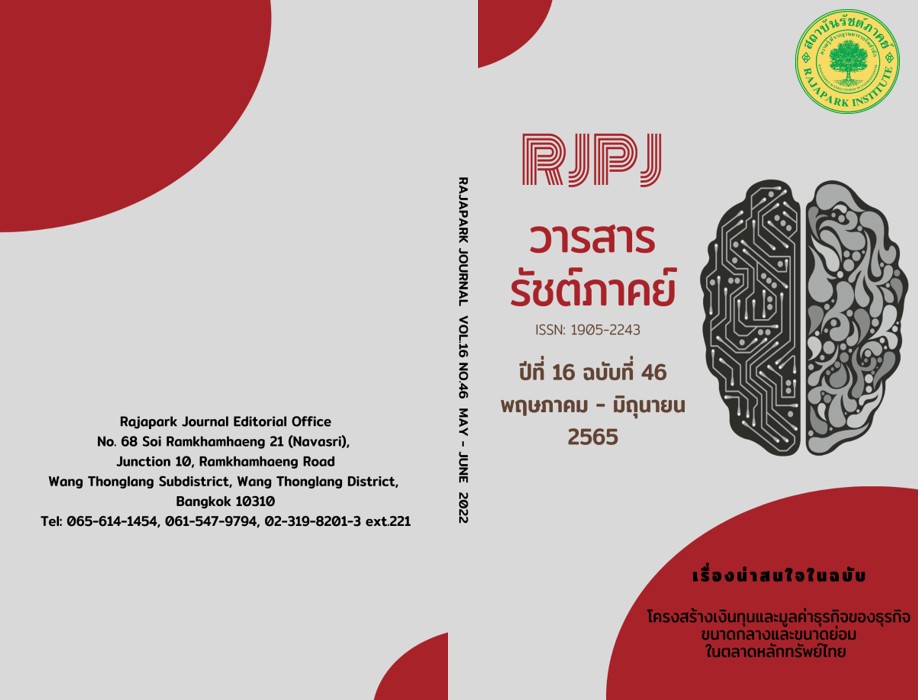Democratic Political Culture of High School Students in the Area of Surat Thani Municipality
Main Article Content
Abstract
This research aimed to study the democratic political culture of high school students in Surat Thani Municipality. and compare the political-cultural relations classified according to the students' personal characteristics. This leads to a method for enhancing the democratic political culture of high school students in Surat Thani Municipality. The researcher used a quantitative method. surveyed by using closed-ended questionnaires It is primarily a research tool. together with qualitative research Using the method of calculating the sample size according to the Taro Yamane formula, a sample of 400 people was obtained. The results showed that the democratic political culture of high school students as a whole and each aspect had the highest opinions. And the test results of the relationship between personal factors and various factors found that there was no relationship with the democratic political culture of high school students in Surat Thani municipality, statistically significant. Approaches to promoting democratic political culture among students in the area the researcher suggested that educational institutions or departments related to education should include curriculum content. about democratic governance in learning courses for all ages to ensure continuous learning Encourage students to have space for social expression Politics for a creative exchange of ideas and promote learning beyond classroom learning so that students can learn and express themselves appropriately
Article Details

This work is licensed under a Creative Commons Attribution-NonCommercial-NoDerivatives 4.0 International License.
Views and opinions appearing in the Journal it is the responsibility of the author of the article, and does not constitute the view and responsibility of the editorial team.
References
Aimpaiwan, V. (1997). Finance and Budget (14th ed.). Sukhothai Thammathirat Open University.
Akakul, T. (2007). Research Methods in Behavioral Sciences and Social Sciences. Vittaya Offset Kanpim.
Jiasaku, S. (2021). New Conceptual Framework: with the Change of Governance 1932. Thai Research and Management Journal, 2(1), 87-94.
Kamkum, N., & Asuwatthanakun, C. (2018). Democratic Political Culture of Undergraduate Students Mahidol University Salaya Campus. Mahidol University.
Nakata, T. (2000). Thai Democracy. SAHY BLOCK & KARNPIM.
Nakata, T. (2003). The Great Thinkers of the World: Philosophy and Political Theory. Public Administration Association, National Institute of Development Administration.
Nokyai, S. (2015). Democratic Political Culture of Personnel of the College of Medical Technology and Public Health, Kanchanaphisek[Master’s Thesis, Silpakorn University].
Pipitkun, K., Thaithong, P., & Phramaha Pruch Atthaporn. (2017). Political Culture of Democracy in Roi-et Province. Journal of MCU Social Sciences Review, 6(2-3), 647-657.
Promgird, P. (2013). Political Sociology (2nd ed.). Khon Kaen University.
Raksasat, A. (2005). Documentation for Teaching Policy Development. Faculty of Public Administration National Institute of Development Administration.
Sengphairogh, W. (2012). Political Consciousness and the Development of Democratic Political Culture among the Youths in Education Institutes in Bangkok during B.E. 2549-2554 [Doctoral Dissertation, Krirk University].
Suttiakan, P. (1988). Democratic Political Culture of the People of Patio District, Yasothon Province[Master’s Thesis, Kasetsart University].
Teesuwan, H. (2020, August 18). White Bow tie Against Dictatorship. BBC News. https://www.bbc.com/thai/thailand-53821787
The Secondary Educational Service Area Office Suratthani Chumphon. (2020). Fiscal Year Performance Report 2020. Policy and Planning Group.


